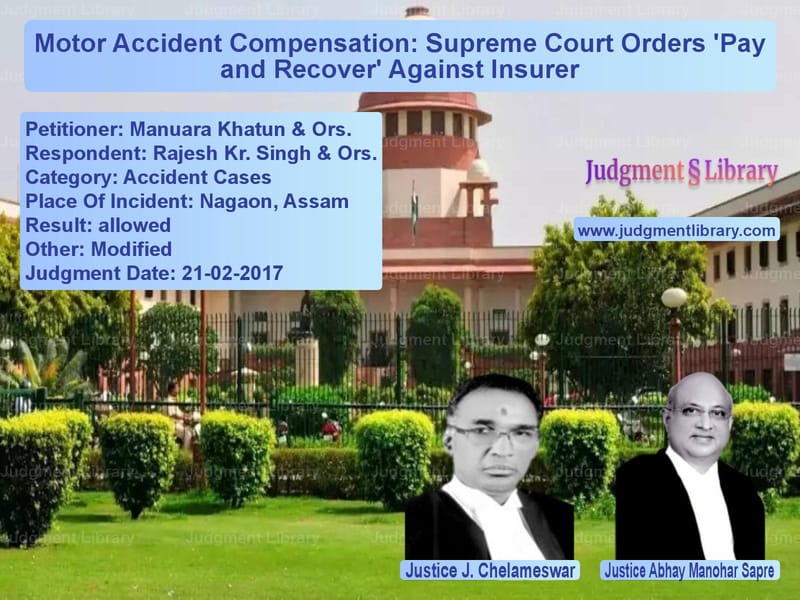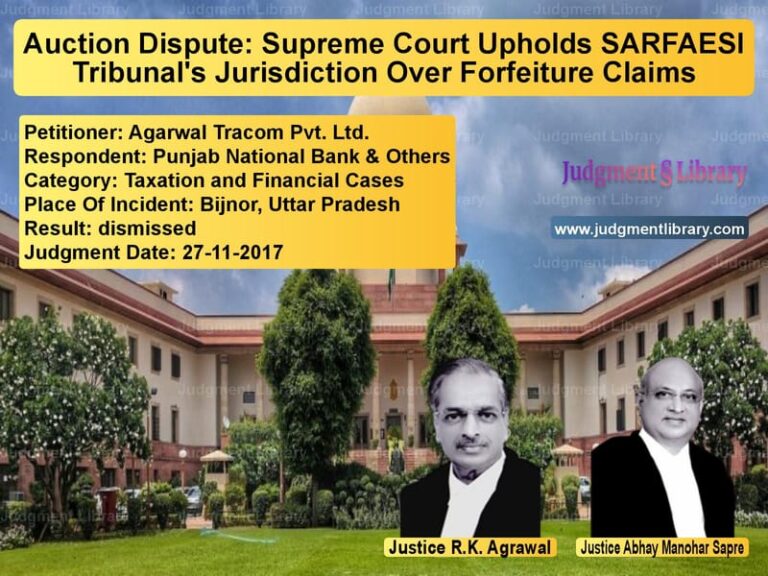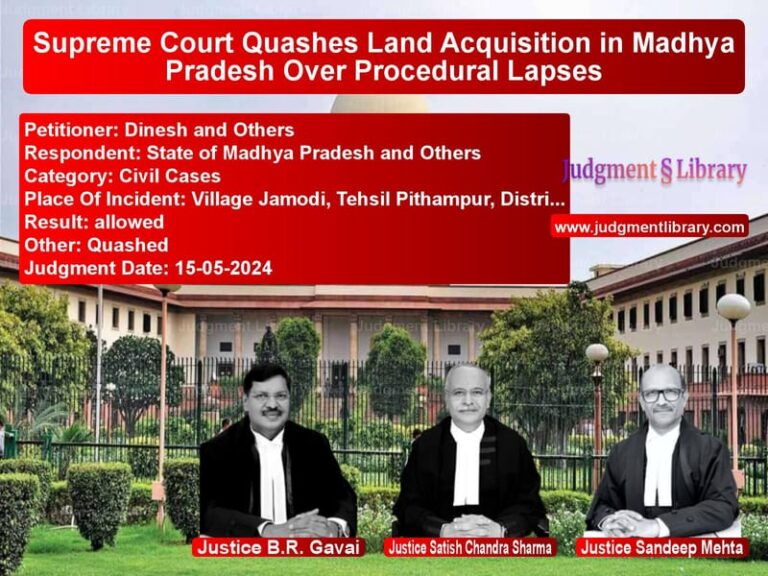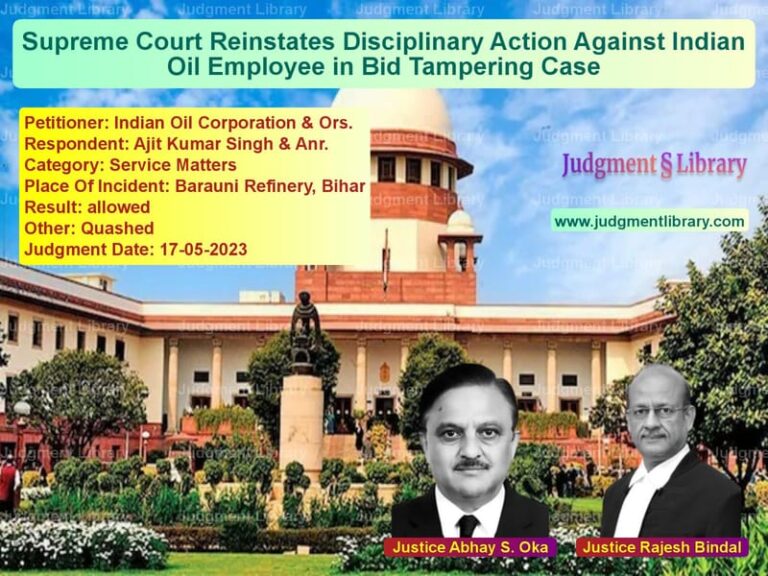Motor Accident Compensation: Supreme Court Orders ‘Pay and Recover’ Against Insurer
Introduction
The Supreme Court of India, in the case of Manuara Khatun & Ors. v. Rajesh Kr. Singh & Ors., addressed a crucial question regarding motor accident compensation claims. The case arose from a tragic accident in which the victims’ families sought compensation from the insurer of the offending vehicle. The core issue was whether the insurance company, which had been absolved of liability due to the deceased passengers being ‘gratuitous passengers,’ could still be directed to ‘pay and recover’ from the vehicle owner.
The Court ruled in favor of the claimants and directed the insurer to first compensate the victims’ families and then recover the amount from the owner of the vehicle. This judgment reaffirms the principle of protecting accident victims while ensuring that insurers are not unduly burdened when contractual liability does not exist.
Background of the Case
The case involved two separate but similar accident claims:
- On 03.07.2001, Ismail Hussain and Nirod Prasad Mohanty, along with other passengers, were traveling in a Tata Sumo (AR-09-3997) from Nagaon to Guwahati.
- Near Jorabat, the Tata Sumo collided head-on with a truck (AS-01-H-2598), resulting in the deaths of Ismail Hussain and Nirod Prasad Mohanty.
- The deceased’s families filed claim petitions before the Motor Accident Claims Tribunal (MACT), seeking compensation from the vehicle owners and their insurers.
The claims were filed as follows:
- MAC Case No. 653 of 2001: Filed by Manuara Khatun (wife of Ismail Hussain) and her five minor children, claiming Rs. 55,20,400.
- MAC Case No. 652 of 2001: Filed by Mamoni Saikia Mohanty (wife of Nirod Prasad Mohanty) and her three minor children, claiming Rs. 54,62,500.
The claim petitions named the following respondents:
- Rajesh Kumar Singh (owner of Tata Sumo).
- Bhadra Kr. Das (owner of the truck).
- United India Insurance Co. Ltd. (insurer of Tata Sumo).
- New India Assurance Co. Ltd. (insurer of the truck).
While the vehicle owners did not contest the claims, the insurance companies opposed their liability, particularly United India Insurance Co. Ltd.
Key Legal Issues Considered
The Supreme Court considered the following legal issues:
- Whether the insurance company was liable to compensate the claimants despite the deceased being ‘gratuitous passengers.’
- Whether the insurer could be directed to ‘pay and recover’ from the vehicle owner.
- Whether the compensation awarded by MACT was fair and just.
Petitioner’s (Claimants’) Arguments
The claimants argued:
- The accident resulted from the negligent driving of the Tata Sumo driver.
- The insurance company should be held liable to pay the compensation.
- Even if the insurance company was not directly liable, the principle of ‘pay and recover’ should apply.
Respondent’s (Insurance Companies’) Arguments
The insurers countered:
- The Tata Sumo was a private vehicle and was not meant for commercial passenger transport.
- The deceased passengers were ‘gratuitous passengers’ and hence not covered under the policy.
- The insurance company had no contractual obligation to compensate the claimants.
Supreme Court’s Observations
The Supreme Court analyzed the previous judgments, including:
- National Insurance Co. Ltd. v. Baljit Kaur & Ors. (2004): The insurer was directed to pay and recover.
- National Insurance Co. Ltd. v. Challa Upendra Rao & Ors. (2004): The insurer was held liable even when the policy did not cover the deceased.
- Manager, National Insurance Co. Ltd. v. Saju P. Paul & Anr. (2013): The ‘pay and recover’ principle was upheld.
Following this reasoning, the Supreme Court ruled:
“The insurer of the offending vehicle is directed to first pay the awarded sum to the claimants and then recover the paid amount from the vehicle owner.”
The Court justified this approach by stating:
“The aim of motor accident compensation laws is to ensure that victims do not suffer due to technicalities regarding insurance contracts.”
Final Judgment
The Supreme Court ruled:
- United India Insurance Co. Ltd. (insurer of Tata Sumo) must pay the compensation to the claimants.
- After making the payment, the insurer may recover the amount from the vehicle owner.
- The compensation amounts awarded by MACT were upheld.
Significance of the Judgment
This ruling has significant implications for motor accident compensation:
- It reaffirms that victims’ rights take precedence over technical insurance coverage limitations.
- It reinforces the ‘pay and recover’ principle, ensuring timely compensation.
- It prevents vehicle owners from evading liability by using insurance loopholes.
Implications for Vehicle Owners and Insurers
The ruling serves as a warning to vehicle owners and insurers:
- Vehicle owners must ensure proper insurance coverage for all passengers.
- Insurers must prepare for ‘pay and recover’ obligations in cases of gratuitous passengers.
- Claimants can be assured of compensation even when policy exclusions exist.
Conclusion
The Supreme Court’s decision in Manuara Khatun & Ors. v. Rajesh Kr. Singh & Ors. strengthens victim protection under motor accident laws. The ruling ensures that compensation is provided promptly and shifts the financial burden to the vehicle owner where applicable. This judgment reinforces the ‘pay and recover’ principle and serves as a guiding precedent in similar cases.
Don’t miss out on the full details! Download the complete judgment in PDF format below and gain valuable insights instantly!
Download Judgment: Manuara Khatun & Ors vs Rajesh Kr. Singh & O Supreme Court of India Judgment Dated 21-02-2017.pdf
Direct Downlaod Judgment: Direct downlaod this Judgment
See all petitions in Compensation Disputes
See all petitions in Motor Vehicle Act
See all petitions in Judgment by J. Chelameswar
See all petitions in Judgment by Abhay Manohar Sapre
See all petitions in allowed
See all petitions in Modified
See all petitions in supreme court of India judgments February 2017
See all petitions in 2017 judgments
See all posts in Accident Cases Category
See all allowed petitions in Accident Cases Category
See all Dismissed petitions in Accident Cases Category
See all partially allowed petitions in Accident Cases Category







